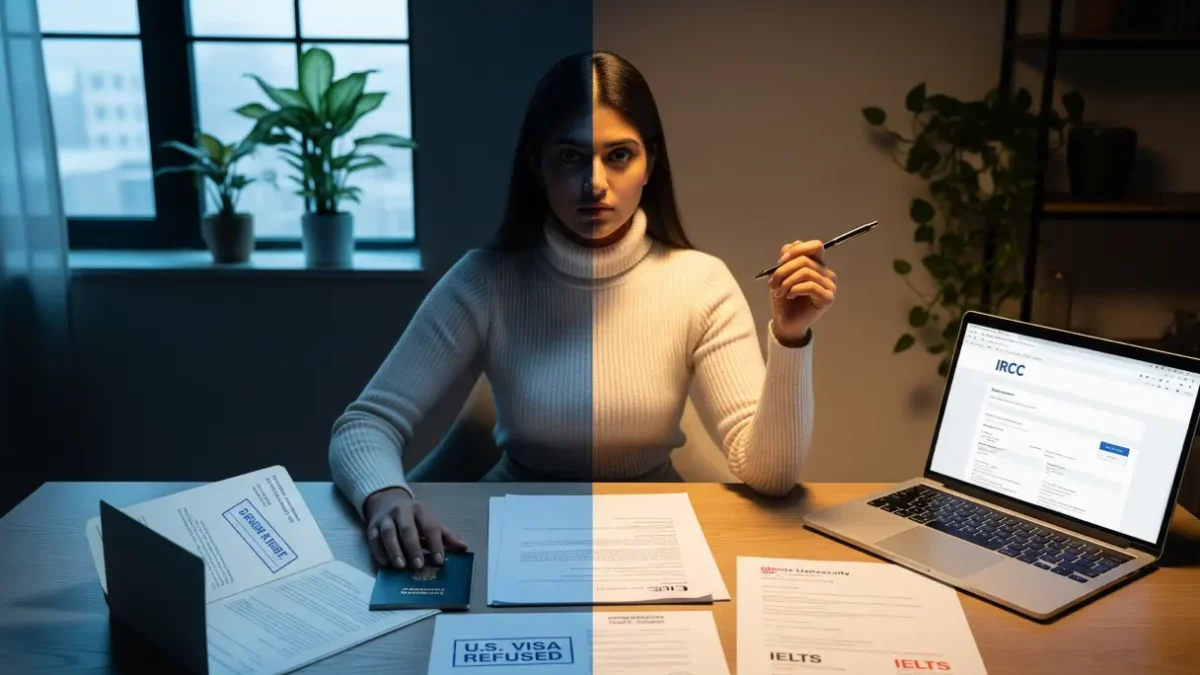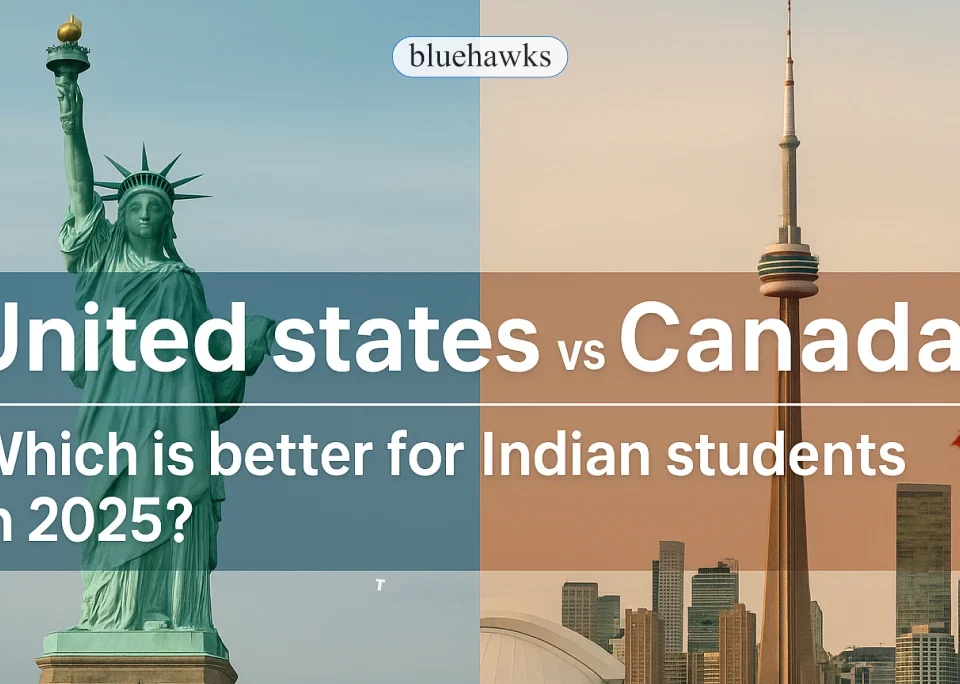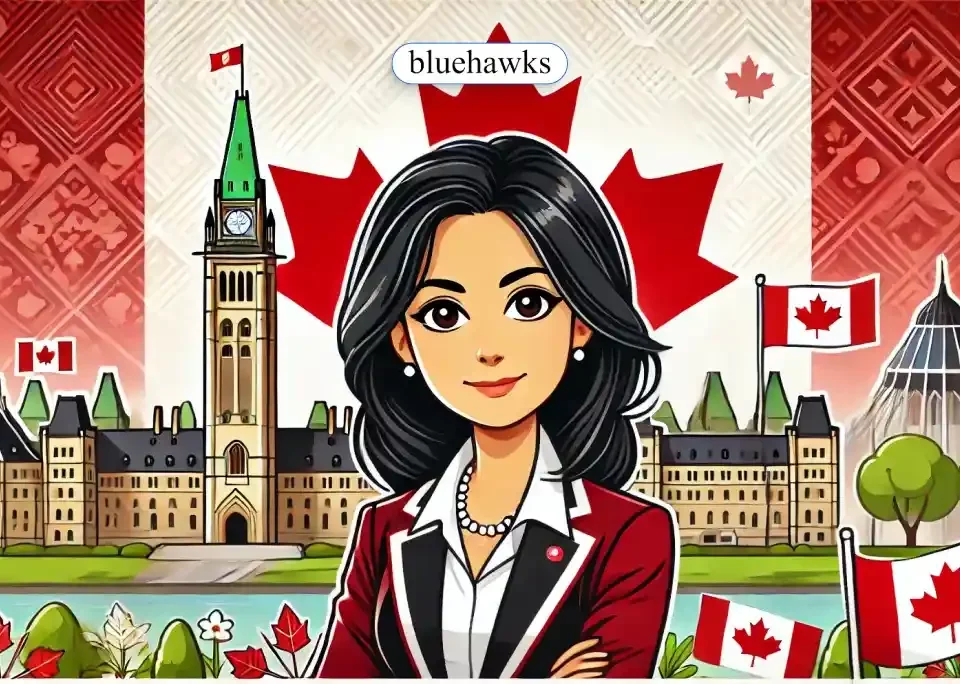Does US Visa Refusal Affect Canada Study Visa?

Estimated reading time: 4 minutes
If you’ve recently faced an F1 visa refusal for the U.S., you’re definitely not alone. Every year, thousands of students dream of studying in America, only to face disappointment at the consulate — often under section 214(b) (where the officer isn’t convinced about your financials, ties, or intent).
Table of contents
- Yes, You Have to Disclose It — But It’s Not the End
- How Canada Looks at a US Visa Refusal
- Why Students Choose Canada After a U.S. Refusal
- Common Mistakes Students Make After a U.S. Refusal
- How to Explain Your U.S. Refusal in a Canadian Application
- Why Next-Gen Mobility Companies Like Bluehawks EduAbroad Matter
- Final Thoughts: A Refusal Isn’t the End
But here’s the good news: a U.S. refusal doesn’t mean your study abroad journey is over. In fact, many students in your shoes are now turning to Canada, the UK, and Australia — the other big destinations in the “Big 4.” Among them, Canada often stands out because of its PR opportunities, world-class institutions, and post-study work options.
So, the big question is: Will my U.S. refusal stop me from getting a Canada study visa? Let’s break it down.
Yes, You Have to Disclose It — But It’s Not the End
When you apply for a Canadian study permit, you’ll see a direct question on the forms:
👉 “Have you ever been refused a visa for any country?”
The answer here must be YES if you’ve faced a U.S. refusal. Trying to hide it can backfire — in fact, misrepresentation can lead to a 5-year ban from Canada.
But here’s the reassuring part: just because you were refused by the U.S. doesn’t automatically mean Canada will say no. What matters is why you were refused and how you now present your case.
How Canada Looks at a US Visa Refusal
Canadian visa officers don’t simply copy the U.S. decision. Instead, they look at:
- Reason for U.S. refusal → Was it 214(b)? Weak financial proof? Poor ties to home country?
- Your financial strength today → Canada recently doubled its proof-of-funds requirement to CAD 20,635. Showing genuine funds is crucial.
- Clarity of your study plan → Why this course? Why this institution? Why Canada instead of the U.S.?
- Consistency of documents → Academic transcripts, acceptance letters, and finances all need to line up.
If your U.S. refusal was just about weak ties or a less convincing interview, and you now show a stronger, future-proof plan, Canada can still approve your application.
Why Students Choose Canada After a U.S. Refusal
For many students, Canada becomes the natural next choice after a U.S. disappointment:
- 🇨🇦 Pathways to PR: Study → PGWP → PR makes Canada attractive for long-term settlement.
- 📚 Globally respected education: From University of Toronto to Waterloo to smaller but career-focused colleges.
- 🎓 No visa interviews: Canada relies mostly on documents, unlike the high-pressure U.S. visa interview process.
- 💼 Work opportunities: Post-study work permits and co-op programs make Canada very student-friendly.
So, while the U.S. may have closed its door, Canada can open a bigger one — if your application is strong.
Common Mistakes Students Make After a U.S. Refusal
Unfortunately, many students repeat the same errors when applying to Canada:
- Copying the same SOP approach they used for the U.S.
- Submitting weak financial proof (forgetting Canada’s stricter fund rules).
- Hiding the refusal instead of explaining it.
- Applying randomly to colleges without linking academics and career goals.
These mistakes raise red flags for visa officers — and often lead to another refusal.
How to Explain Your U.S. Refusal in a Canadian Application
The best approach? Be honest, brief, and positive. For example:
“I was refused a U.S. F1 visa under section 214(b) as the officer was not convinced about my ties to India. Since then, I have strengthened my application by arranging clear financial proof, choosing a course aligned with my academic background, and preparing a long-term career plan in Canada.”
This shows maturity, transparency, and growth — all things officers respect.
Why Next-Gen Mobility Companies Like Bluehawks EduAbroad Matter
Here’s the truth: the old ways don’t work anymore. With Canada’s stricter rules and the U.S. already tough, you need a smarter, visa-first approach. That’s where Bluehawks EduAbroad comes in:
- ✅ Visa-first strategy → We focus on applications built for approval, not just admissions.
- 🌍 Multi-country pathways → If Canada feels uncertain, we guide you toward the UK or Australia too.
- ✍️ Tailored SOPs & documents → No copy-paste. Every application reflects your story.
- 🎯 Experience with refusals → We’ve helped many students who faced U.S. refusals successfully get into Canada, the UK, and Australia.
In short: we don’t just chase offers — we chase outcomes.
Final Thoughts: A Refusal Isn’t the End
If you’ve faced a U.S. F1 visa refusal, it may feel like your dream has ended. But in reality, it’s just a redirection. Canada, the UK, and Australia are incredible destinations with world-class universities, strong career outcomes, and welcoming immigration pathways.
The key is to learn from your refusal, strengthen your case, and apply with clarity.
And remember — with the right guidance, a refusal can actually become the turning point that leads you to even greater opportunities.
👉 If you’re a student with an F1 refusal and now want to explore Canada, UK, or Australia, connect with Bluehawks EduAbroad. Let’s turn your setback into a comeback.
💬 Chat with our 24/7 chat support team, just tap on that WhatsApp button on the right bottom of your screen 👉



